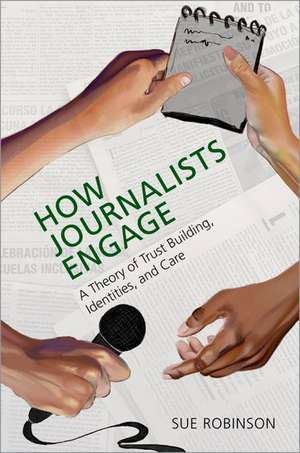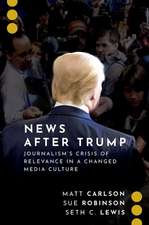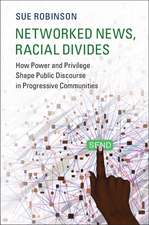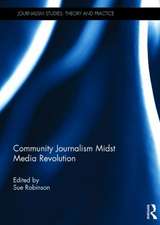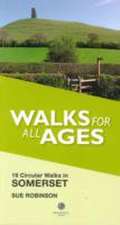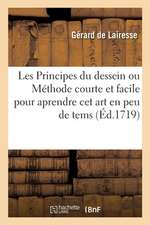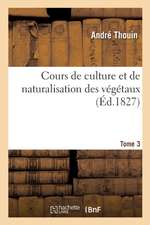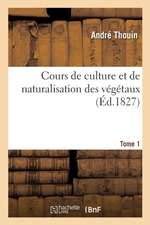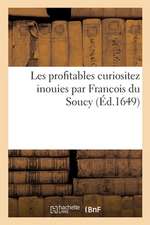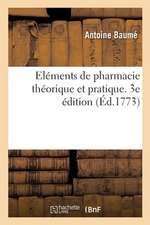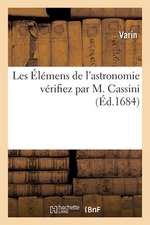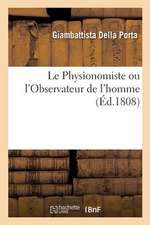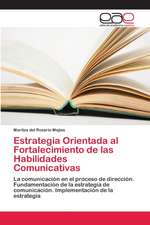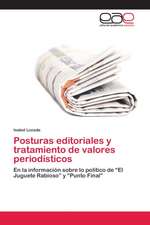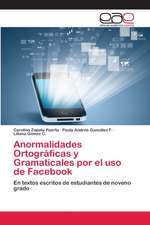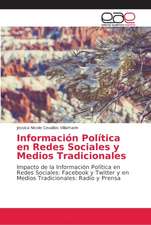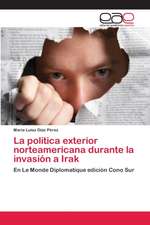How Journalists Engage: A Theory of Trust Building, Identities, and Care
Autor Sue Robinsonen Limba Engleză Paperback – 27 iul 2023
| Toate formatele și edițiile | Preț | Express |
|---|---|---|
| Paperback (1) | 134.84 lei 10-16 zile | +34.48 lei 6-12 zile |
| Oxford University Press – 27 iul 2023 | 134.84 lei 10-16 zile | +34.48 lei 6-12 zile |
| Hardback (1) | 401.18 lei 31-37 zile | |
| Oxford University Press – 10 iul 2023 | 401.18 lei 31-37 zile |
Preț: 134.84 lei
Preț vechi: 154.68 lei
-13% Nou
Puncte Express: 202
Preț estimativ în valută:
25.80€ • 27.01$ • 21.48£
25.80€ • 27.01$ • 21.48£
Carte disponibilă
Livrare economică 26 februarie-04 martie
Livrare express 22-28 februarie pentru 44.47 lei
Preluare comenzi: 021 569.72.76
Specificații
ISBN-13: 9780197667125
ISBN-10: 0197667120
Pagini: 264
Dimensiuni: 235 x 159 x 16 mm
Greutate: 0.38 kg
Editura: Oxford University Press
Colecția OUP USA
Locul publicării:New York, United States
ISBN-10: 0197667120
Pagini: 264
Dimensiuni: 235 x 159 x 16 mm
Greutate: 0.38 kg
Editura: Oxford University Press
Colecția OUP USA
Locul publicării:New York, United States
Recenzii
The doctrine of neutral professionalism tells journalists that their work will be trusted if they keep themselves out of it. No, says Sue Robinson, you have put yourselves into it. You have to engage with the people you are trying to inform and come clean about your own identity as a private citizen and public professional. Her brave book, How Journalists Engage, describes the 'built environment' where an alternative—and far more humble—approach is slowly coming into view. In this detailed account of engagement work, there is a rethinking of journalism's entire professional project. I, for one, welcome that.
In How Journalists Engage, Susan Robinson has done something refreshing: She's taken the chaos of an industry besieged by challenges in a turbulent world and extracted a framework that can give journalists a firmer footing. Not sure what it will take to strengthen our ties to an anxious, divided public? Her four new roles and eight new skill sets are a strong place to start.
How Journalists Engage illuminates the changing role of trust in the contemporary news ecosystem. Professor Robinson has written an important book for scholars and practitioners alike.
Now more than ever, journalism is faced with the challenge of how to build trust within our increasingly fractured and polarized communities. How Journalists Engage is essential reading for anyone interested in this vital challenge. Building on rich and rigorous empirical research, including a diverse range of engagement case studies, it calls for an ethic of 'identity-aware care,' suggesting that journalists must prioritize listening to and learning from the diverse communities they serve.
The admirable research presented within its pages makes it a must-read. Furthermore, it possesses the capacity to inspire and stimulate fruitful empirical research in the realm of journalism ethics.
In How Journalists Engage, Susan Robinson has done something refreshing: She's taken the chaos of an industry besieged by challenges in a turbulent world and extracted a framework that can give journalists a firmer footing. Not sure what it will take to strengthen our ties to an anxious, divided public? Her four new roles and eight new skill sets are a strong place to start.
How Journalists Engage illuminates the changing role of trust in the contemporary news ecosystem. Professor Robinson has written an important book for scholars and practitioners alike.
Now more than ever, journalism is faced with the challenge of how to build trust within our increasingly fractured and polarized communities. How Journalists Engage is essential reading for anyone interested in this vital challenge. Building on rich and rigorous empirical research, including a diverse range of engagement case studies, it calls for an ethic of 'identity-aware care,' suggesting that journalists must prioritize listening to and learning from the diverse communities they serve.
The admirable research presented within its pages makes it a must-read. Furthermore, it possesses the capacity to inspire and stimulate fruitful empirical research in the realm of journalism ethics.
Notă biografică
Sue Robinson is the Helen Firstbrook Franklin Professor of Journalism in the School of Journalism & Mass Communication at the University of Wisconsin-Madison. She is the author of Networked News, Racial Divides: How Power and Privilege Shape Public Discourse in Progressive Communities (2018), which won the AEJMC Tankard Book Award, and co-author (with Matt Carlson and Seth C. Lewis) of News After Trump: Journalism's Crisis of Relevance in a Changed Media Culture (Oxford, 2021).
